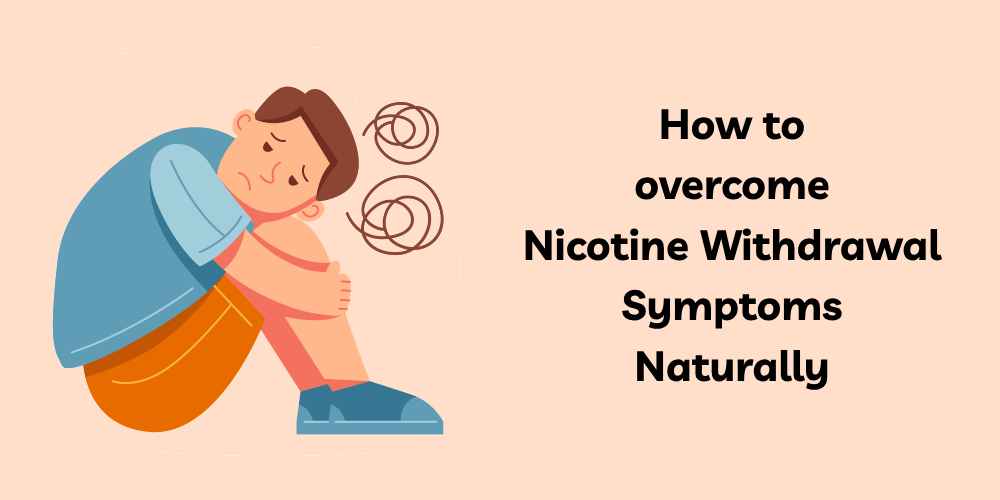
Can You Overcome Nicotine Withdrawal Symptoms Naturally?
When it comes to overcoming nicotine withdrawal symptoms naturally, many people find themselves facing a significant challenge. The journey to quit smoking can be a daunting one, filled with a lot of physical and psychological hurdles. Nicotine, a highly addictive substance, creates strong dependency, making withdrawal an uncomfortable process. However, by understanding the symptoms and implementing natural strategies, you can navigate this journey more smoothly. Whether you’re a smoker looking to quit or someone supporting a loved one, learning about these natural methods can be incredibly beneficial. Let’s dive into practical tips and strategies that can help ease the process and support a healthier, smoke-free life.
Understanding Nicotine Withdrawal
Before diving into the strategies, it’s essential to understand what nicotine withdrawal is and why it happens. Nicotine is a highly addictive substance that is found in cigarettes and other tobacco-related products. When you quit smoking, your body needs time to adjust to the absence of nicotine, which leads to withdrawal symptoms.
Common Withdrawal Symptoms
- Cravings: Strong urges to smoke, especially during activities previously associated with smoking.
- Irritability: Feeling easily annoyed or frustrated.
- Anxiety: Increased feelings of nervousness or worry.
- Depression: A sense of sadness or hopelessness.
- Difficulty Concentrating: Trouble focusing on tasks.
- Increased Appetite: A desire to eat more, which can lead to weight gain.
- Insomnia: Difficulty falling or staying asleep.
Understanding these symptoms can help you prepare for and manage them more effectively.
Natural Strategies to Overcome Nicotine Withdrawal
1. Exercise Regularly
Physical activity is a powerful tool in combating nicotine withdrawal symptoms. Exercise helps release endorphins, which are natural mood lifters, and can reduce stress and anxiety. Exercise will also provide you with a healthy distraction from cravings.
- Aerobic Exercise: Activities like walking, running, cycling, or swimming can significantly reduce withdrawal symptoms.
- Strength Training: Lifting weights or doing bodyweight exercises can improve mood and increase energy levels.
- Yoga and Meditation: These practices promote relaxation and help manage stress and anxiety.
2. Stay Hydrated
Drinking plenty of water helps flush nicotine and other toxins out of your body. Staying hydrated can also help manage cravings and reduce feelings of hunger that often accompany withdrawal.
- Drink Water: Aim for at least eight glasses of water a day.
- Herbal Teas: Teas like chamomile, peppermint, and ginger can be soothing and provide additional hydration.
3. Eat a Healthy Diet
A balanced diet can support your body’s recovery from nicotine addiction. There are certain foods that can help reduce cravings and improve your mood.
- Fruits and Vegetables: These are rich in vitamins and antioxidants that help repair the damage caused by smoking.
- Whole Grains: Foods like oats, brown rice, and whole wheat bread provide sustained energy and help stabilize blood sugar levels.
- Protein: Lean meats, fish, beans, and nuts help keep you full and satisfied.
- Avoid Sugary and Fatty Foods: These can trigger cravings and lead to weight gain.
4. Get Plenty of Rest
Sleep is crucial for your body to heal and adjust to the absence of nicotine. Withdrawal can sometimes cause insomnia, so it’s essential to prioritize good sleep hygiene.
- Maintain a Consistent Schedule: Ensure you go to bed and wake up at the same time each day.
- Create a Relaxing Environment: Make your bedroom a quiet, dark, and cool place to sleep.
- Avoid Stimulants: Limit caffeine and avoid screens before bedtime.
5. Practice Stress-Reduction Techniques
Stress is a significant trigger for smoking, so finding ways to manage stress can help you stay smoke-free.
- Deep Breathing: Engage in deep breathing exercises to help relax your mind and body.
- Mindfulness Meditation: This can help you stay present and manage stress more effectively.
- Progressive Muscle Relaxation: This involves tensing and then relaxing different muscle groups to reduce physical tension.
6. Use Natural Supplements
Certain natural supplements can help alleviate withdrawal symptoms and support your body during the quitting process.
- St. John’s Wort: This herb is often used to treat mild depression and can help improve mood during withdrawal.
- Valerian Root: Known for its calming effects, valerian root can help with anxiety and sleep issues.
- Lobelia: This herb has been used to reduce cravings and withdrawal symptoms.
7. Seek Support
Having a strong support system can make a significant difference in your quitting journey. Friends, family, and support groups can offer both encouragement and accountability.
- Join a Support Group: Connect with others who are going through the same experience.
- Talk to Loved Ones: Let your friends and family know you are quitting so they can offer support.
- Consider Therapy: Speaking with a therapist can help address underlying emotional issues related to smoking.
8. Stay Busy
Keeping your mind and body occupied can help distract you from cravings and withdrawal symptoms.
- Pick Up a Hobby: Engage in activities that you enjoy and that keep you busy.
- Volunteer: Helping others can bring a sense of purpose and fulfillment.
- Stay Active: Engage in regular physical activity to keep your mind off smoking.
9. Avoid Triggers
Recognizing and steering clear of triggers can help manage cravings and prevent relapse.
- Change Your Routine: Alter routines that you associate with smoking.
- Avoid Places Where You Used to Smoke: Stay away from locations that trigger cravings.
- Find New Ways to Relax: Replace smoking with healthier relaxation techniques.
10. Reward Yourself
Celebrate your milestones and reward yourself for your progress. This approach can help you stay motivated and focused on your objective.
- Set Goals: Establish short-term and long-term goals for your quitting journey.
- Treat Yourself: Reward yourself with something special when you reach a milestone.
- Keep a Journal: Track your progress and reflect on your achievements.
Several studies support the effectiveness of natural methods in managing nicotine withdrawal symptoms. According to research published in the Journal of Clinical Nursing, exercise can significantly reduce nicotine cravings and withdrawal symptoms. Another study in the American Journal of Public Health found that a healthy diet can improve mood and reduce the likelihood of relapse.
Research also suggests that mindfulness and meditation can help manage stress and anxiety, which are common triggers for smoking. A study in the journal Addiction found that mindfulness-based interventions can significantly reduce cigarette use and cravings.
Conclusion
Overcoming nicotine withdrawal symptoms naturally is a challenging but achievable goal. By incorporating exercise, staying hydrated, eating a healthy diet, getting plenty of rest, practicing stress-reduction techniques, using natural supplements, seeking support, staying busy, avoiding triggers, and rewarding yourself, you can successfully navigate the withdrawal process and achieve a smoke-free life.
Always Remember, that quitting smoking is a journey, and it’s crucial to be patient with yourself. Every step you take towards overcoming nicotine addiction is a step towards better health and a brighter future. Stay committed, seek support when needed, and celebrate your progress along the way. You have the strength and resilience to overcome nicotine withdrawal and live a healthier, smoke-free life.




